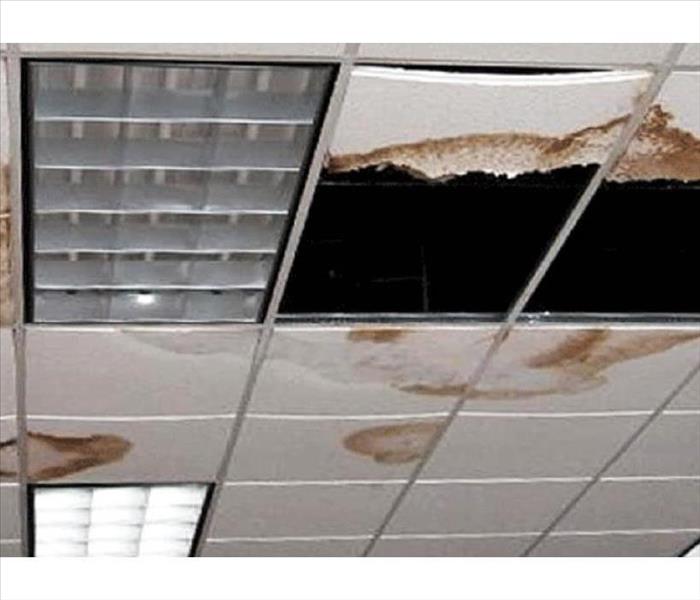WHAT TO DO IF YOU FIND A LEAK IN YOUR COMMERCIAL BUILDING
2/28/2019 (Permalink)
 Leaks come in all shapes and sizes. With a little bit of education you can be better prepared for when they do happen.
Leaks come in all shapes and sizes. With a little bit of education you can be better prepared for when they do happen.
It only takes a small leak in a commercial building to cause extensive water damage. The longer the leak goes unnoticed, the more damage you can expect.
Common leaks detected in commercial buildings
Any building can spring a leak. But commercial buildings are put under quite a bit more stress than residential buildings, with heavy use of bathrooms, kitchens and other water-intensive processes. Learn about the most common types of leaks found in commercial buildings, and what you can do to fix them.
Faucet leaks
Every faucet has components that can wear out over time, especially with frequent use. When a seal or other faucet component begins to leak, it leads to ongoing water loss. When the drip becomes a trickle or a flow, water loss can be extensive and your water bill can substantially increase.
Toilet leaks
Toilets have a number of parts that can wear and lead to issues, especially water loss. For example, a flapper that fails to create a solid seal will allow water to leak from the toilet tank drain. If leaks like these aren’t repaired as soon as possible, you may experience additional damage to other toilet components, your water bill may increase significantly, and you may eventually have to replace the entire toilet to remedy the problem.
Underground leaks
Underground leaks often go unnoticed. Signs that you may be experiencing an underground leak include:
- Areas of wet soil
- Areas where grass, plants, or other items are growing faster than their surroundings
- Unexpected rises in water bills
Items like sewer drains, water supply pipes, or other buried piping systems require water leak detection equipment to help locate any leaks. If found, pipes can be dug up and repaired. If not, exploratory digging may be necessary to find the source of the leakage.
Hidden leaks
A leak can hide anywhere in a commercial building. If the leak is not discovered early, the amount of water loss and damage caused may be extensive.
Signs of hidden leaks include:
- Increases in the water bill
- Wet surfaces
- Water marks and swelling of the walls, ceiling, and floors
Once the leak is identified, it may require pulling out walls, ceilings, and other major pieces of the building to fix the leak and repair the damage.
How to detect plumbing leaks in your commercial building
Installing a leak detection system can make it much easier to identify potential leaks and address them as quickly as possible. These systems can be extremely beneficial in commercial buildings, as they allow for the creation of a building-wide detection system.
Technology offers some exciting innovations in leak detection. Wireless water leak detectors can communicate by phone, text, and email when a leak is detected. Cloud-based sensors are also available that integrate with a portal where you can monitor all sensors in a system. There are even automated sensors which can shut off water in certain applications. If you are unsure which type of water leak detection equipment is best for your building, consult a contractor before installation.
What to do if you find a leak
If you suspect a leak in your business, contact SERVPRO of The Saint Croix Valley. We are here to help, 24 hours a day, seven days a week. 715-381-2266.






 24/7 Emergency Service
24/7 Emergency Service